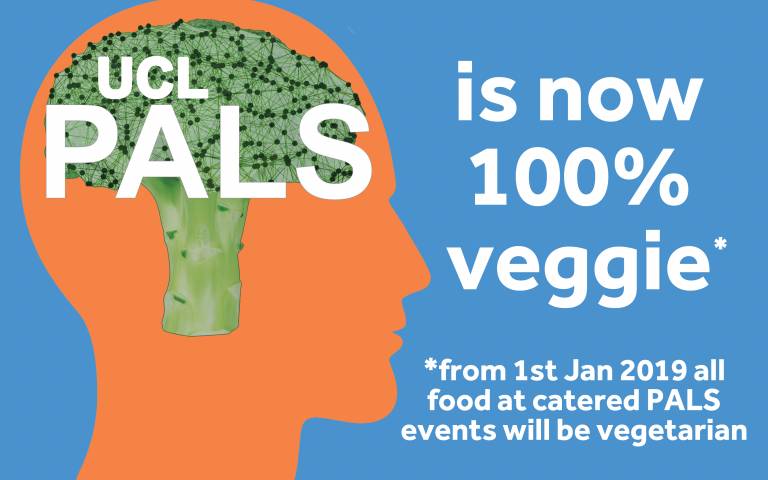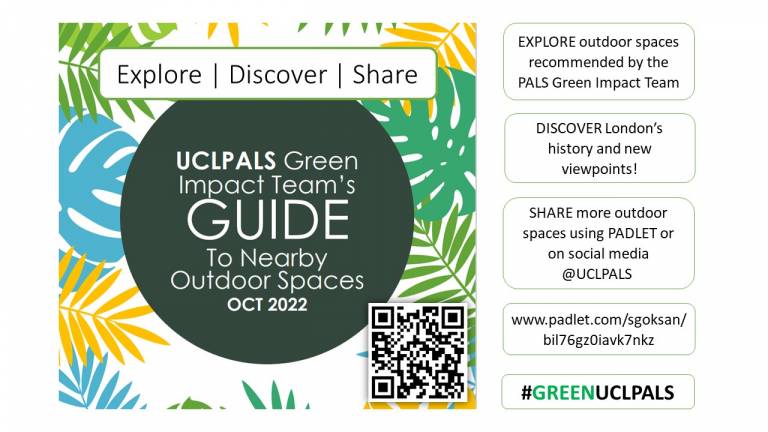
8 January 2019
From 1st January 2019 all food provided at catered UCL PALS events will be 100% vegetarian. This was agreed at the UCL PALS Staff Meeting on 6th December 2018. Since then, much of UCL has adopted it. As a University, we are now providing over 95% vegetarian food for all events.
Professor Peter Fonagy (Head of UCL PALS) says: "There is an increasing evidence-base to support the enhanced wellbeing of those who do not consume meat. It is our strategic objective in 2019 as a Division to improve the wellbeing of our staff. The decision to exclude meat products from Division-funded functions is in line with this objective. I apologise to all those who do not experience this as in line with their preferences, but in the interest of the many it seems to me that this is a wise and informed choice."
John Draper (Head of UCL PALS Administration) was pleasantly surprised at the response from the Division after making the suggestion on behalf of the UCL PALS Green Impact Team. He says: "I'm really pleased that PALS is making this pledge to further our commitment to Green Impact initiatives."
When learning about the PALS 100% Veggie initiative, Richard Jackson (UCL Sustainability Director) said: "We are delighted that the UCL Division of Psychology and Language Sciences are leading the way in sustainability by going 100% vegetarian. The meat industry is one of the least sustainable sectors, emitting 51% of annual greenhouse gas emissions and clearing 88% of rainforests for grazing. We’re overwhelmed with the commitment that the UCL community has shown this academic year in pushing sustainability to the front of UCL’s agenda and leading us towards a sustainable future."
What does eating meat have to do with being green? Oliver Milman writes in the Guardian: "A swathe of research released over the past year has laid bare the hefty impact that eating meat, especially beef and pork, has upon the environment by fuelling climate change and polluting landscapes and waterways... if the world is to stave off dangerous climate change, beef consumption in western countries need to drop by 90%, replaced by five times more beans and pulses."
On behalf of the UCL Vegan and Vegetarian Society, Yashvini Shukla (Campaigns Officer) said: "It is simply incredible that UCL PALS are going 100% vegetarian. As part of the the UCL Vegan and Vegetarian Society campaign '50by2020' (that encourages UCL staff and students to commit to consuming at least 50% vegan food by 2020) we hope that more groups within UCL will take such a progressive step as UCL PALS."
Aliza Ayaz, President of the UCL Climate Action Society (CAS), says: "UCL CAS is very excited that PALS is taking climate action by making vegetarianism a norm, given that avoiding meat consumption is one of the biggest things an individual can do for the environment! PALS' example is an excellent motivator for students and institutions to be greener during this new year. We hope that other faculties will follow in PALS' footsteps soon."
Dr Jake Fairnie, neuroscientist and core member of the UCL PALS Green Impact Team, says: "I'm thrilled to be a part of the group that helped nudge UCL PALS to become veggie. There is now compelling evidence that reducing meat consumption decreases environmental impact on the planet (see Poore & Nemecek, 2018 and Springmann et al., 2015 for starters) and improves personal health (Clinton et al., 2015; Craig, 2009; Springmann et al., 2016; Tonstad et al., 2009; Turner-McGrievy et al., 2015). This initiative will no doubt ruffle some feathers but it's time, for the benefit of the planet and ourselves, to put the spam sandwiches down. I would love to encourage others to consider doing the same; on UCL campus and beyond."
UCL PALS PhD student Sabine Topf, who is a core member of the UCL PALS Green Impact Team, writes: "The production of meat is responsible for over half of all agricultural greenhouse gases, air and water pollution and uses enormous amounts of land taken from natural habitats - but produces only about 20% of all calories. I'm very proud to be part of this department and love this clear statement for protecting our environment."
Dr Jeremy Skipper, also a core member of the UCL PALS Green Impact Team and an Associate Professor in PALS, says: "The reasons I am a vegetarian are multidetermined. Besides ethical qualms and health related benefits, the pro-environmental rationale for being a vegetarian is straightforward. The process of killing and eating animals is sucking up and destroying land, the things on that land, and overheating our planet. The latter is caused not only by burping and farting animals but also gases used or released ploughing, watering, and harvesting fields for the enormous amounts of grains it takes to raise animals, the gas released from manure used in those fields, oil burned to take their dead bodies to markets, often far away, and the electricity to cool and later cook their carcasses. So I am happy to be a member of a Division that acknowledges these environmental issues and is doing its part by going vegetarian, even if only circumspectly."
The initiative has received a positive response across the Division, from undergraduate and postgraduate students to academic and administrative staff. For example, Professor Susan Michie (Director of the UCL Centre for Behaviour Change within UCL PALS) said: "Congratulations to PALS for their trailblazing initiative - good for our health, pockets and, most importantly, the future of our planet. Let’s hope the rest of UCL will join us soon."
Much of UCL has adopted this initiative. As a University, we are now providing over 95% vegetarian food for all hospitality events. You can see the timeline of events related to this initiative here.
We hope that PALS going 100% veggie will encourage other departments to make similar pledges towards a sustainable future.
To find out more about the UCL PALS Green Impact initiatives, and to get involved, visit our PALS Green Awareness webpage at: ucl.ac.uk/pals/pals-green-awareness
- UCL Veg Out Do Nation Campgain - pledge now!
- Our obsession for meat is hurting our planet, and we must do something about it. Greenpeace is running a movement for #LessMeatMoreForests. Find out more here: lessismore.greenpeace.org
- Food and Agricultural Organisation of the United Nations report: 26% of the World's ice-free land mass is given over to livestock production.
- New York Times: the combined mass of the 23 billion chickens on Earth is greater than that of all the other birds on Earth put together.
- Report showing that 2393 litres of water are required to make the average fast food burger (equivalent to 30 baths).
- A Vice President of the UCL Climate Action Society is joining 'Veganuary', where she is trying to eat vegan for a month. Read more by clicking this link.
- Worried about limited veggie sandwich options? Here are some suggestions: blog 1, blog 2, blog 3.
- Timeline of events relating to the initiative.
 Close
Close


 Check out the Green Impact Team's
Check out the Green Impact Team's